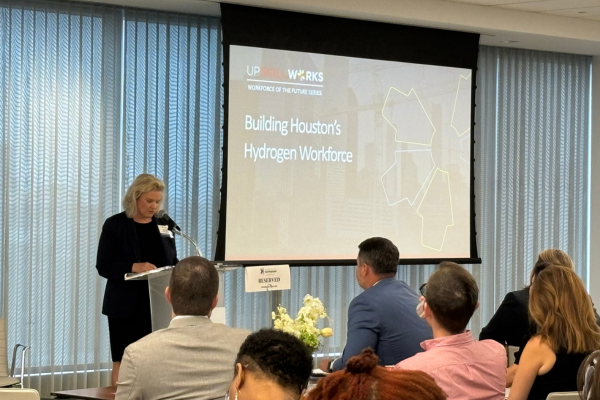Houston Investing in Its Future Hydrogen Workforce with New Development Strategy
Published Apr 22, 2024 by Taylor Tatum
Update 7/17/24: Read the white paper.
Addressing a growing skills gap by closing economic disparities will be critical as Houston’s hydrogen economy grows. To address this opportunity, the Greater Houston Partnership's UpSkill Houston initiative, Accenture and the Center for Houston’s Future (CHF) have launched a new workforce development initiative that aims to help people in disadvantaged communities (DACs) secure good jobs in the emerging hydrogen economy by bridging the skills gap through training and skill development.
According to the executive summary, the strategy will target high-demand and good-paying, middle-skilled hydrogen jobs through a skill-matching process based on skill transferability, among other factors, as well as tailored learning journeys that will provide pathways from education to employment. This will require collaborating with key stakeholders across the hydrogen economy, including local industry employers, educational institutions and nonprofit organizations.
The list of partners includes Air Liquide, Chevron, bp, Bloom Energy, Calpine, Dow, HIG, Linde, Shell, SLB, Brazosport College, Houston Community College, Lee College, Lone Stage College, San Jacinto College, United Way of Greater Houston and Gulf Coast Workforce Solutions. The learning journeys will help people increase their earning potential and provide career stability by having direct access to the hydrogen sector.
“The future growth of the hydrogen industry in Houston and the Gulf Coast provides the region with the opportunity to collaborate with business and industry to rewire the talent pathways into the hydrogen sector and increase economic mobility and opportunity for residents of communities historically underserved.” - Peter Beard, SVP, Regional Workforce Development
The consortium aims to work with community stakeholders and educational institutions to align career and technical education (CTE) in high schools with dual credit in community colleges. The ongoing collaboration with colleges and school districts will also support the development of shorter-term programs for adults.
The new initiative follows the U.S. Department of Energy’s selection of the Gulf Coast as one of seven regional clean hydrogen hubs, with operations centered in Houston.
Brett Perlman, President of the Center for Houston’s Future, says employers must implement inclusive workforce strategies to fill the skills gap and mobilize a sustainably scaled workforce by recruiting talent throughout the community.
Accenture’s research has found a high degree of jobs will be needed for hydrogen with highly correlated skills from other occupations and industries already in place.
“Making this happen requires being very purposeful about the intersection of these opportunities and... working across the ecosystem,” said Mary Beth Gracy, Houston Office Managing Director of Accenture, during a stragey presentation.
The findings also predict a steady rise in middle-skill jobs within Houston’s clean energy hydrogen economy over the next five to 10 years, especially in carbon capture and storage (CCS), as well as consistent growth in manufacturing, application, storage, distribution and production as demand and technology advances.
Robert Nunmaker, General Manager – Hydrogen, USGC & Europe at Chevron, echoed the report's conclusions. "This region plays a key role in supplying lower-carbon hydrogen and ammonia, which will require a skilled local workforce that will be positioned to execute these projects.”
According to research conducted by McKinsey and CHF, Texas - and the Gulf Coast region as a whole - are already the nation’s largest hydrogen producers with more than 1,000 miles of dedicated hydrogen pipelines and 48 hydrogen production plants. The region is also home to a diverse array of energy resources, including a large concentration of academic and industry-driven energy innovation, cutting-edge infrastructure, and a highly skilled workforce.
Looking at the future energy mix, hydrogen is anticipated to be twelve percent of the total energy consumption by 2050, according to the IEA. In its Houston as a Hydrogen Hub – 2050 Snapshot report, the Center for Houston’s Future predicts that 170,000 potential direct, indirect and induced jobs could be created in the hydrogen economy, as well as an additional $100 billion for Texas’ gross domestic product.
Learn more about UpSkill Houston. Read the full strategy.
 The Houston Report
The Houston Report




















